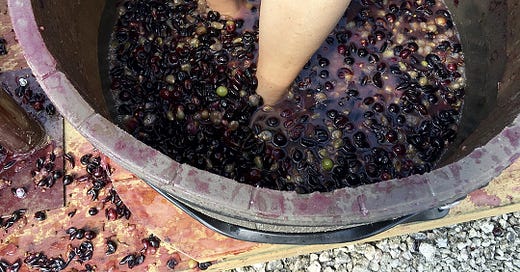This is the weekly newspaper column.
Wine questions answered #2 3-22-2023
Answers to your pressing wine wine questions.
• Port wine can still be made by human feet stomping grapes. Are feet sanitized for this?
Feet are sprayed with sanitizing solutions, then rinsed off before the stomping begins. That is good practice, but because of alcohol content, human pathogens do not survive in wine even if there is no sanitizing. There also are ceremonial foot stompings around harvest, but that is for show and the juice rarely goes into actual production. BTW, modern wine crushers only imitate the pressure of a human foot. Winemakers assert the human foot remains the perfect shape and firmness to crush grapes and break the skin while not crushing the seeds. The ideal? A 120-pound woman with large feet.
• Sometimes an older bottle of wine has sediment. Will it harm me?
It would be odd if an older bottle of wine did not have sediment. Sediment is natural and will not harm you, although it may taste gritty and be unpleasant. When grapes are crushed, flecks of skins, stems, and seeds remain in the juice. After fermentation, yeast cells, tartrates, and polymers remain. Many wines are filtered, but many winemakers think that practice mutes flavors. Some particulate matter remains no matter what.
As wine ages, the particulates fall to the bottom of the bottle. Also, during aging, phenolic compounds such as tannins bond together to create additional sediment. Wine pigments are among those phenolic compounds, which is why a wine’s color fades with age.
Far from indicating a wine is bad, some sediment often is found in higher quality wine, especially with aging. You can avoid putting the sediment in your glass by decanting or by pouring through a filter. You can use a coffee filter, but a fine metal filter is better because coffee filters can add flavors to the wine.
• How long does boxed wine last?
The plastic bags holding wine in boxed wine are semi-permeable for oxygen. That is the reason for the “drink by” date. Oxidation in wine is similar to how a slice of apple turns brown when exposed to air. An un-opened box wine should be good for a year. An opened box wine, especially stored in your refrigerator, can be good for four-plus weeks before it begins to oxidize.
Last round: When you are dressed all in black and some smart aleck asks you who died, simply look around the room and say, “I haven’t decided yet.” Wine time.
Email: wine@cwadv.com
Newsletter: gusclemens.substack.com
Website: gusclemensonwine.com
Facebook: facebook.com/GusClemensOnWine/posts/
Twitter: @gusclemens
Links worth exploring
Diary of a Serial Hostess Ins and outs of entertaining; witty anecdotes of life in the stylish lane.
As We Eat Multi-platform storytelling explores how food connects, defines, inspires.
Balanced Diet Original recipes, curated links about food systems, recipe reviews.















Share this post